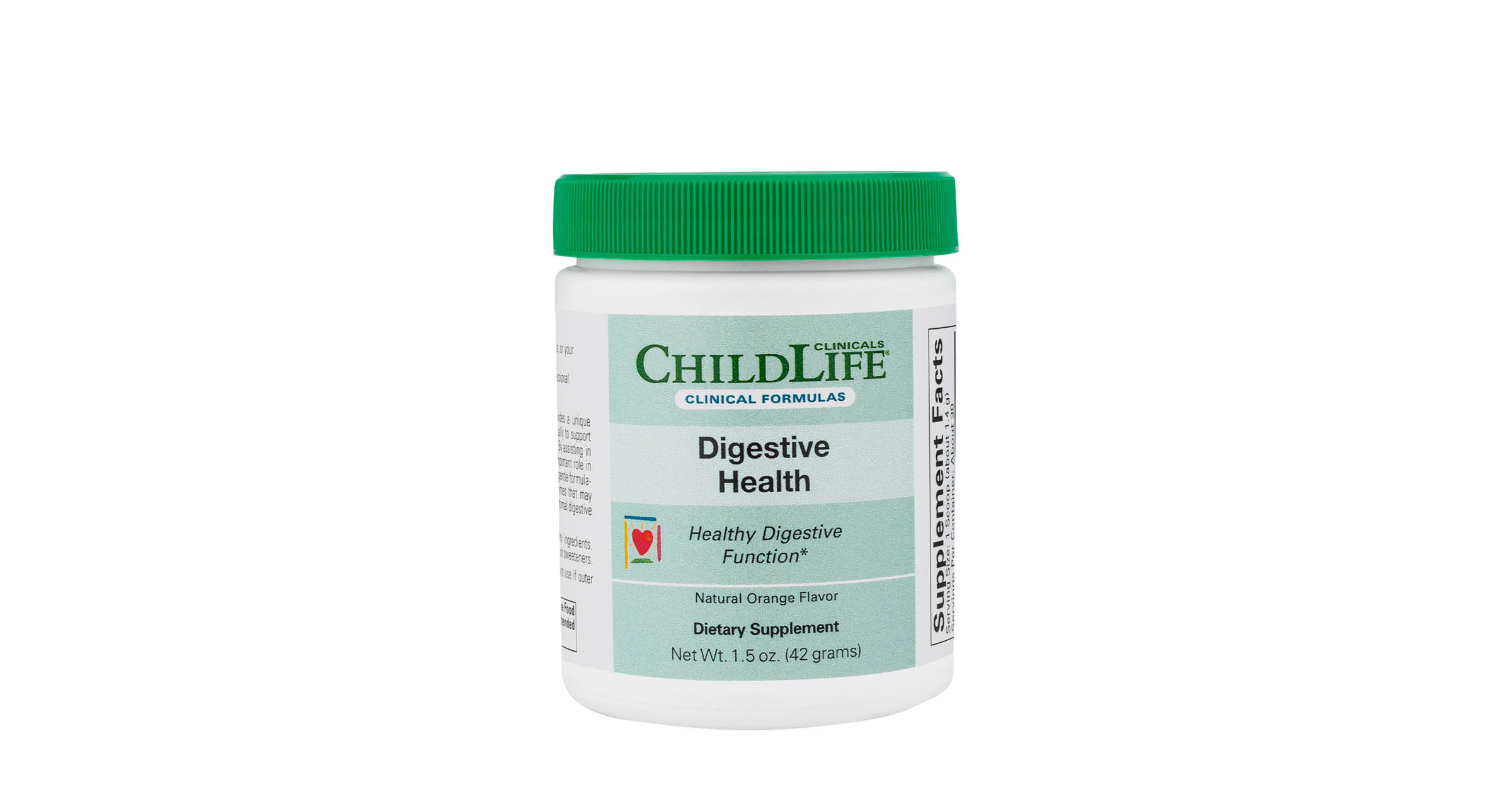Healthy Digestive Support*
Delivers per Serving (1 Scoop About 1.4 g):
1000 mg Digestive Enzyme Blend
- Protease
- Peptidase
- Amylase
- Cellulase
- Lipase
- Lactase
- Glucoamylase
- Invertase
- Pectinase
- Alpha-Galactosidase
- Phytase
Optimize Early-Life Health with ChildLife® Clinicals Digestive Health.
Key Benefits*
- SUPPORTS proper digestion of a variety of foods
- PROVIDES additional support during digestion
- OPTIMIZES nutrient availability
- PROMOTES gastrointestinal health
* These statements have not been evaluated by the Food and Drug Administration. This product is not intended to diagnose, treat, cure, or prevent any disease.
Purpose: To provide clinicians with technical information to determine if the supplement in question is appropriate for their patient.
Digestive Health
ChildLife® Clinicals Digestive Health is a ready-to-mix supplemental powder that provides eleven important digestive enzymes to support digestion.
When certain foods are not fully digested, abdominal bloating and discomfort may occur. Not only can this cause unpleasant symptoms, consequently, chronic malabsorption of nutrients may negatively impact health.
Under normal conditions, the pancreas should secrete enough digestive enzymes to digest each meal. Occasionally, supplemental digestive
enzymes may be used to optimize digestive ability.
Carbohydrates
The breakdown of carbohydrates begins with amylase in the mouth (salivary amylase), and later pancreatic amylase in the small intestines. Amylase is the term for enzymes that help breakdown carbohydrates such as starches and polysaccharides into smaller molecules. Invertase, a sucrase enzyme, has been included in this formula to break down the disaccharide sucrose into monosaccharides glucose and fructose which can be absorbed and utilized by the body. Proper breakdown of carbohydrates is necessary to supply the body with fuel for energy expenditure.1 Inadequate digestion of carbohydrates have resulted in poor weight gain in children.2
Lipids
Lipids are essential to human health, as they provide energy and are fundamental components of cellular membranes, among many other functions.1 Lipase is the enzyme that breaks down fats. The process begins in the oral cavity with mastication and blending with lingual lipase, however the majority of lipase comes from the pancreas and serves the duodenum.1 Triglycerides are broken down and free fatty acids are absorbed and utilized by the body. Comprised of approximately 60% fat, the brain is one organ which depends heavily on proper digestion of lipids.3
Ingredients with Antimicrobial or Anthelmintic Properties
Protease and Peptidase are proteolytic enzymes that help breakdown proteins into smaller fragments, down to amino acids, which can then be utilized by the body. Protein intake and digestion is essential to living organisms as amino acids form proteins within the body. Examples of important proteins include collagen for structure, and hemoglobin to carry oxygen.
Fiber
Cellulase may assist in the dissolution of gastric bezoars, according to studies.4 Sometimes, undigested contents may form a mass in the gastrointestinal tract and require assistance to breakdown adequately to pass.
Lactose Intolerance
Lactase helps break down the complex sugar in milk, lactose, into glucose and galactose for use by the body. When sufficient lactase is lacking, lactose is not digested and gastrointestinal discomfort and disturbances often occur. Infants and young children typically have ample lactase production, as breastmilk contains significant lactose. As children wean, the amount of lactase produced tends to decrease in certain populations.5 Lactose malabsorption is defined as a reduced ability to digest lactose after infancy, and is prevalent in 68% of the world’s population.6
Supplementation with digestive enzymes may be beneficial to individuals in need of additional digestive support.
References:
- Berdanier CD, Zempleni J. Advanced Nutrition: Macronutrients, Micronutrients, and Metabolism. Boca Raton, FL: Taylor & Francis; 2009.
- Hopson P, Patel S, Bornstein J, Mehta D, Horvath K. Isolated Amylase Deficiency in Children and Its Clinical Implication. J Pediatr Gastroenterol Nutr. 2019 Jun;68(6):854-860. doi: 10.1097/MPG.0000000000002317.
- O’Brien JS, Sampson EL. Lipid composition of the normal human brain: gray matter, white matter, and myelin. J Lipid Res. 1965;6(4):537-44.
- Chun J, Pochapin M. Gastric Diospyrobezoar Dissolution with Ingestion of Diet Soda and Cellulase Enzyme Supplement. ACG Case Rep J. 2017;4:e90.
- Misselwitz B, Fox M. What is normal and abnormal in lactose digestion? The Lancet. Gastroenterology & Hepatology. 2017;2(10):696–697.
- Storhaug CL, Fosse SK, Fadnes LT. Country, regional, and global estimates for lactose malabsorption in adults: a systematic review and meta-analysis. The Lancet. Gastroenterology & Hepatology. 2017;2(10):738–746.
- Suarez F, Levitt MD, Adshead J, Barkin JS. Pancreatic supplements reduce symptomatic response of healthy subjects to a high fat meal. Dig Dis Sci. 1999;44(7):1317-21.
- Ianiro G, Pecere S, Giorgio V, Gasbarrini A, Cammarota G. Digestive Enzyme Supplementation in Gastrointestinal Diseases. Curr Drug Metab. 2016;17(2):187–193.doi:10.2174/138920021702160114150137
- Majeed M, Majeed S, Nagabhushanam K, et al. Evaluation of the Safety and Efficacy of a Multienzyme Complex in Patients with Functional Dyspepsia: A Randomized, Double-Blind, Placebo-Controlled Study. J Med Food. 2018;21(11):1120–1128. doi:10.1089/jmf.2017.4172

